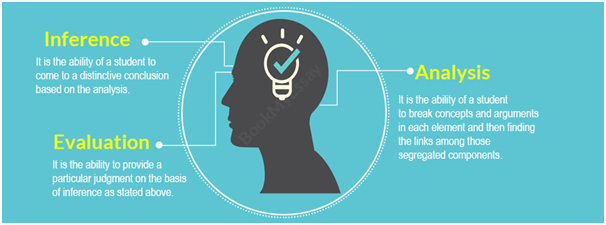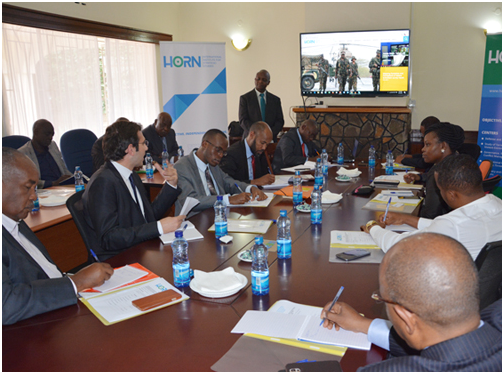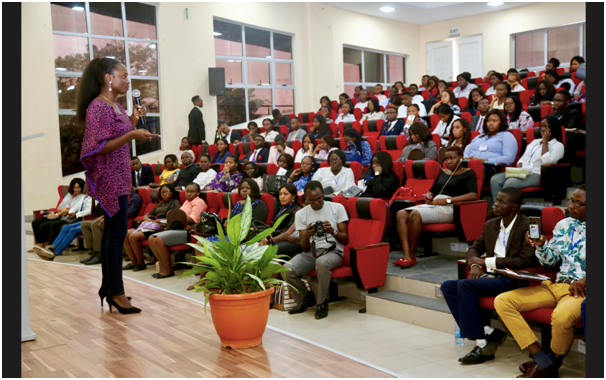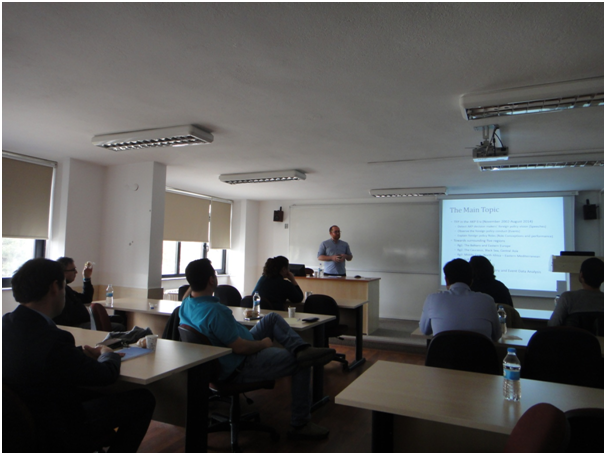

Allied to our research, as part of our systems thinking, are critical thinking, writing and analysis,including engaging with thought leaders.We like to believe that at AU Watch we ‘think different.’ As the notes from our Chairperson and CEO states, we are neither daunted by the challenges of Africa nor afraid to ask difficult and confrontational questions. We believe critical thinking, writing and analysis offers a superior way to get to root causes of challenges that are of interest to us, and to collectively arrive at solutions for the good of Africa.
Since its founding, AU Watch has earned a reputation as a “think and do” tank, where independent research is channeled into practical policy proposals that help to shape decisions in many capitals in Africa international institutions and around the world.
What is Critical Thinking, Writing and Analysis?
 The challenges to the AU and AUMS system remain systemic, systematic and synergetic, and therefore addressing particular issue areas is not as simple as clustering policy initiatives because of the inter-linkages between the issues. Five core areas need to be addressed simultaneously in order to make inroads for an efficient AU system that has as its core objective and Africa at peace with itself. These are:
The challenges to the AU and AUMS system remain systemic, systematic and synergetic, and therefore addressing particular issue areas is not as simple as clustering policy initiatives because of the inter-linkages between the issues. Five core areas need to be addressed simultaneously in order to make inroads for an efficient AU system that has as its core objective and Africa at peace with itself. These are:
(1)addressing Africa’s poor governance architecture and promoting and protecting human rights
(2) institutional capacity and reform
(3) concretizing a responsive and realistic security architecture
(4) addressing the pernicious issue of corruption and
(5) implementing a continent wide political economic integration, including the African Continental Free Trade Area (ACFTA), notwithstanding the consolidation of regionalisation.
At AU Watch we continually question received wisdom. We understand that our state managers have a habit of telling us ‘stories’. We refuse to accept those ‘stories’ as gospel truths. Critical thinking is the process of identifying and solving problems by gathering information, analysing and evaluating evidence, discovering patterns, and reasoning logically. Critical thinking in writing means asking the right questions and questioning the old, no-longer-obvious answers.
Central to critical thinking is the ability to think ‘outside’ a piece of writing: not only understanding the writer’s message, but deciding
• whether the message is valid or not
• whether the evidence and discussion given supports the message
• how the message fits into the broader context
At AU Watch, we are:
• Persistent
• Constantly reviewing the evidence
• Sceptical: ‘hermeneutic of suspicion’ – always asking‘Why am I being told this’?
• Who is telling me this? (vested interests, bias)
• What am I not being told? Where’s the evidence to support this?
• How much of this is rhetoric?
• How else might the same data be read?
• Looking ahead: what are the implications of this?
How Do We Use Critical Thinking and Writing?
 Critical thinking, writing and analysis is also tied in with building and strengthening capacities of our key constituents – our volunteers, staff, Governing Council, media professionals, CSOs and other individuals we work with. It underpins all we do. By sharing skills and knowledge through our outreach work, publications, training, events, TV and radio programmes, we empower people to question what their leaders say they are doing on their behalf.
Critical thinking, writing and analysis is also tied in with building and strengthening capacities of our key constituents – our volunteers, staff, Governing Council, media professionals, CSOs and other individuals we work with. It underpins all we do. By sharing skills and knowledge through our outreach work, publications, training, events, TV and radio programmes, we empower people to question what their leaders say they are doing on their behalf.
We do not have all the answers, but that doesn’t stop us from challenging the status quo. Together we can find the answers. For example, is the AU a useful organisation? Should it be abandoned? The question is important because a large majority of its constituents have no faith in it and believe it’s not fit for purpose. Is the NGO community in Africa properly positioned to assist in addressing issues they will like the AU and its Members to address? Do we really think doing more of the same is adequate, if our economic and political systems themselves need to be transformed in order to get to grips with regional challenges? Don’t you think it’s preposterous for a whole continent to have to refer to the ‘Amnesty Internationals’ or ‘Transparency Internationals, ‘Oxfams’ of this world or to the UN, if we want ‘reliable’ facts and statistics on human rights, corruption and development?
Why can’t the AU lead the way or support African led and based organisations to conduct research and publish on some of the very contentious issues affecting hundreds of millions of its citizens? Do we really need northern based NGOs to tell us how poorly or how well we are doing? Do we really need Oxfam to map out development indices for us? Do we need Amnesty International to tell us how terrible our state of human rights is, or Transparency International to tell us how corrupt our leaders are? Don’t you think or (sub) regional organisations should be leading research into these areas or at the very least supporting CSOs that do?
An AU that Needs Immediate Reforms
We understand these are difficult questions for the AU and its Members. But so what? Resolving some of Africa’s entrenched challenges requires a dogged determination to find answers; a determination never to allow our energy or enthusiasm to be dampened by the discouragement that must inevitably come, and a commitment to think ahead, to be self-critical and to be open to new ideas, roles and relationships, even if our state managers and funders think otherwise. If we are serious about attaining the vision of Agenda 2063, then answers to those questions will emerge if all of us are engaged in the conversation, and are actively engaged in critical discussions with the AU and AUMS. And we need an AU that is open to real reforms.
 Wither Kagame Reforms?
Wither Kagame Reforms?
President Paul Kagame’s reform package provides the architecture to address the institutional capacities of the continental body by redressing systemic and systematic practices that deal with continental priorities, institutional realignment, sustainable financing, operational effectiveness and efficiency. All of this points to an institutional recalibration that will hold greater relevance for Africa in the 21st Century by protecting the human rights of people, creating an environment for economic opportunities and connecting the diaspora in a more pragmatic way to support the continent’s development agenda.
Through critical thinking, writing and analysis, we:
• Deliver knowledge, transparency, and expert guidance to the AU, AUMS, our publics, especially women and girls, solving social problems through the mobilization of the masses.
 • We gather, analyze and publish data on a range of issues like corruption, development, human rights, share it worldwide, and help to empower disadvantaged communities in Africa to understand their rights and ability to improve themselves and the region. Our Journals Unit is responsible for publishing the Journal of African Studies on the African Union, AU Watch State of the Union (SOTU): Human Rights; AU Watch ‘State of the Union (SOTU): Development; Regional Corruption Index; Regional Insecurity Index and other journals, books and magazines.
• We gather, analyze and publish data on a range of issues like corruption, development, human rights, share it worldwide, and help to empower disadvantaged communities in Africa to understand their rights and ability to improve themselves and the region. Our Journals Unit is responsible for publishing the Journal of African Studies on the African Union, AU Watch State of the Union (SOTU): Human Rights; AU Watch ‘State of the Union (SOTU): Development; Regional Corruption Index; Regional Insecurity Index and other journals, books and magazines.
AU Watch is looking out for collaborating institutions to assist it in its publishing objectives. For more information on the Publishing Committee and its Directorate and what you can do to assist the team, please email [email protected].
“What transforms this world is — knowledge. Do you see what I mean? Nothing else can change anything in this world. Knowledge alone is capable of transforming the world, while at the same time leaving it exactly as it is. When you look at the world with knowledge, you realize that things are unchangeable and at the same time are constantly being transformed.”
Kimitake Hiraoka a Japanese author, poet and playwright
We are reaching out to Africa’s policy and state managers to improve the political and legislative terrain in which CSOs and media professionals’ work, as they are a crucial plank in developing people’s capacity to make informed choices and changing minds and attitudes. We are now developing curricula for primary, secondary and tertiary levels on knowledge about the AU – courses / curricula which we believe should be taught at civics, history or politics classes in our schools and universities. Is there any justification why our schools are not offering courses on ‘AU Law and Institutions’, or ‘AU History’, but instead our institutions teach ‘UN Law and History’? Building and strengthening capacities for us means knowing how our own systems work as well!
• Design practical, imaginative policy prescriptions. Our task at AU Watch is not merely to understand how to improve on the issues we work on, but identifying the centrifugal forces that pulls the AUMS system and those who in the AUMS system that can pull them, whether political, legal, financial or ultimately, military.
Since decisions of Africa’s transformation are too important to be left in the hands of policy makers and politicians in executive circles to decide upon alone, CSOs like AU Watch will continue to play an active role of accelerating transformation, of policy formulation and seismic shifts from rhetoric to reality in Africa. In that regard, AU Watch aims to be a major publishing establishment assisting the AU in Africa’s transformative journey. Our vision is for AU Watch to become the principal informative hub for Africa about the AU and AUMS, thereby contributing toward the promotion of democracy, human rights, multidimensional security, and the advancement of sustainable and inclusive development